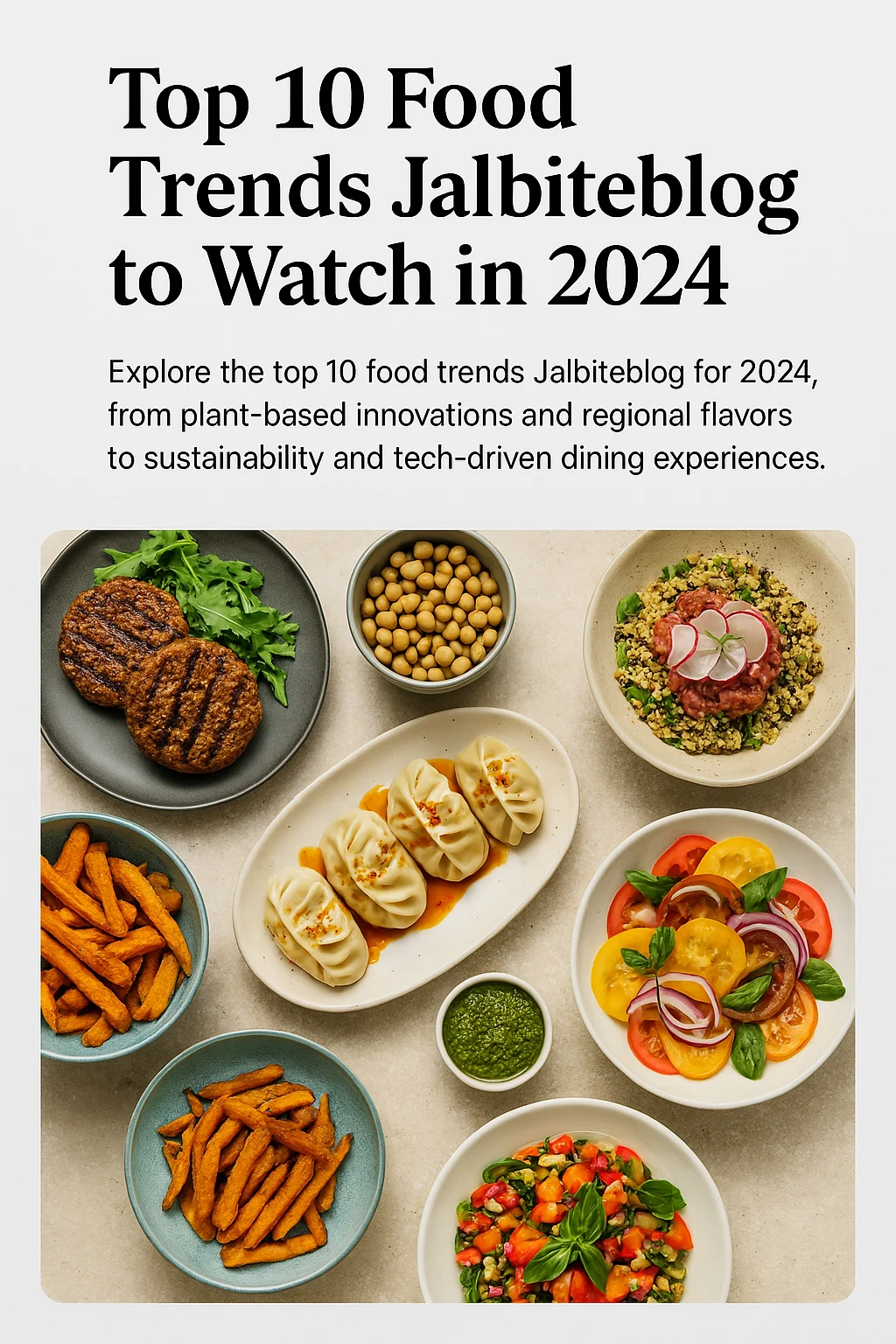Food trends have always been a fascinating reflection of culture, innovation, and consumer behavior. As the world evolves, so does the way we eat, cook, and appreciate food. The rise of social media, global influences, and an increasing focus on health and sustainability have contributed to the emergence of new food trends. This article delves deep into the latest food trends Jalbiteblog and explores how they are shaping the culinary landscape worldwide.
- The Rise of Plant-Based Diets and Alternative Proteins
- Fusion Cuisine: Blending Cultures for Unique Flavors
- The Popularity of Functional Foods and Superfoods
- Sustainable and Zero-Waste Cooking
- The Influence of Technology on Food Trends
- Experiential Dining and Themed Restaurants
- A Look at Food Trends Jalbiteblog in Numbers
- The Future of Food Trends Jalbiteblog
The Rise of Plant-Based Diets and Alternative Proteins
One of the most significant shifts in food consumption is the increasing adoption of plant-based diets. People are now more conscious of their health, environmental sustainability, and ethical considerations, leading to a surge in plant-based alternatives. Ingredients like jackfruit, tofu, and tempeh are becoming mainstream meat substitutes, offering rich flavors and nutritional benefits.
Beyond traditional plant-based ingredients, alternative proteins are gaining popularity. Lab-grown meat, insect-based proteins, and pea-protein burgers are making their way onto restaurant menus and supermarket shelves. These innovations aim to provide sustainable protein sources while reducing the carbon footprint associated with conventional meat production.
Fusion Cuisine: Blending Cultures for Unique Flavors
Globalization has opened doors to new culinary experiences, leading to the rise of fusion cuisine. Food lovers are now embracing the blending of diverse culinary traditions, creating exciting and unique flavor combinations. Korean tacos, sushi burritos, and Indian-style pizzas are just a few examples of how chefs are experimenting with flavors to cater to adventurous palates.
Fusion cuisine is not just about mixing flavors but also about incorporating various cooking techniques. Asian-inspired barbecue, Mediterranean-style rice bowls, and Middle Eastern-infused burgers showcase how different culinary traditions can complement each other, offering a rich and diverse dining experience.
The Popularity of Functional Foods and Superfoods
Health-conscious consumers are seeking foods that offer more than just sustenance. Functional foods and superfoods are now a key focus in the food trends Jalbiteblog movement. Ingredients such as turmeric, spirulina, matcha, and adaptogenic herbs are being incorporated into everyday meals to enhance health benefits.
Functional foods aim to boost immunity, improve digestion, and support mental health. Probiotic-rich foods like kimchi, kombucha, and yogurt are in high demand as people recognize their role in gut health. Additionally, ancient grains like quinoa, amaranth, and farro are replacing traditional staples, offering better nutrition and unique textures to dishes.
Sustainable and Zero-Waste Cooking
Sustainability is a crucial factor influencing food trends today. With growing concerns about food waste and environmental impact, many restaurants and home cooks are adopting zero-waste cooking techniques. The focus is on using every part of an ingredient, from root to stem, reducing waste and maximizing flavor.
Sustainable practices include sourcing ingredients locally, reducing single-use plastics, and composting food scraps. More establishments are embracing farm-to-table concepts, ensuring that their food is ethically sourced and environmentally responsible. Upcycling food waste into new culinary creations, such as turning vegetable peels into chips or using coffee grounds in desserts, is also becoming a widespread practice.
The Influence of Technology on Food Trends
Technology is revolutionizing the food industry in various ways. From AI-driven recipe creation to smart kitchen appliances, technological advancements are enhancing how we prepare and experience food. Automated cooking devices, such as smart ovens and precision cookers, make home cooking more accessible and efficient.
Food delivery apps and cloud kitchens are changing the restaurant industry, making gourmet food available at the click of a button. Online platforms also play a crucial role in food education, providing tutorials, live cooking sessions, and recipe inspiration for home chefs looking to experiment with new trends.
Experiential Dining and Themed Restaurants
Dining is no longer just about food; it is about the experience. Experiential dining concepts are gaining traction, offering customers immersive and interactive food experiences. Themed restaurants, pop-up dining events, and multi-sensory dining experiences are capturing the interest of food enthusiasts.
Some restaurants incorporate virtual reality elements, where diners can explore different settings while enjoying their meals. Others focus on interactive cooking, allowing customers to participate in the preparation of their dishes. This trend enhances engagement and transforms dining into a memorable experience.
A Look at Food Trends Jalbiteblog in Numbers
To better understand the impact of these food trends, let’s look at some key statistics:
| Food Trend | Market Growth Rate | Popular Ingredients |
|---|---|---|
| Plant-Based Foods | 10% annual growth | Jackfruit, tofu, lentils |
| Alternative Proteins | Expected to reach $17.9B by 2025 | Lab-grown meat, pea protein, insect protein |
| Functional Foods | 8% annual increase | Turmeric, matcha, probiotics |
| Sustainable Eating | 65% of consumers prefer eco-friendly brands | Locally sourced, zero-waste practices |
The Future of Food Trends Jalbiteblog
As food trends continue to evolve, we can expect more innovations in the culinary world. The rise of personalized nutrition, where diets are tailored to individual genetic profiles, is becoming a reality. Smart kitchens equipped with AI-driven meal planners and automated cooking assistants will make home cooking more efficient and enjoyable.
Moreover, sustainability will remain a top priority, with more emphasis on regenerative agriculture, carbon-neutral food production, and circular economy practices in the food industry. New flavors, cooking techniques, and ingredients will keep emerging, ensuring that the world of food remains exciting and ever-evolving.
